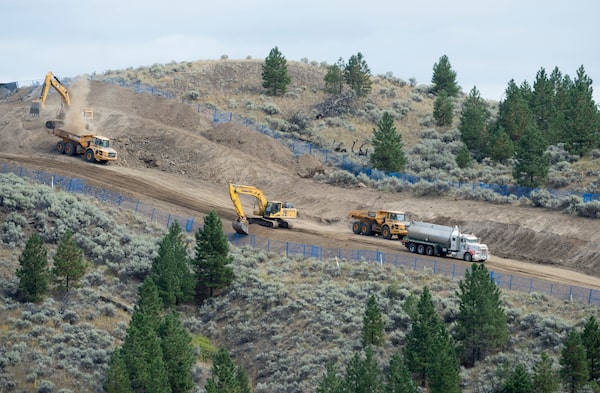
Construction of the Trans Mountain pipeline is seen under way in Kamloops, B.C., in September, 2020.JONATHAN HAYWARD/The Canadian Press
The first shipments of crude flowing through the Trans Mountain pipeline extension are expected to arrive on the West Coast in early May, more than a decade after the $34-billion project was launched to bring landlocked Alberta oil to lucrative overseas markets.
Oil started filling the TMX in Edmonton the week of April 15, Trans Mountain chief operating officer Mike Davies said in a recent interview. It will take about three weeks to make the 1,150-kilometre journey to the Burnaby Terminal in British Columbia.
Mr. Davies said the shipments are a “very structured process” that takes place in segments along the pipeline, though ”it’s not a process that has an exact hard date on it.”
But May 1 is a fixed date for the government-owned pipeline. After more than a decade of starts and stalls, court cases and delays owing to floods, fires and COVID-19, it marks the official launch of the most expensive infrastructure project in Canadian history.
The first coastal deliveries from the system, which are expected in early to mid-May, will not only find buyers in markets beyond the United States, but will begin to erase the deep discount on Alberta crude prices.
Reliance Industries Ltd., for example, has bought two million barrels of Canadian crude from Shell PLC for July delivery, marking the Indian refiner’s first oil purchase from the pipeline expansion, according to Reuters. The company joins a growing group of Asian refiners buying Canadian crude to be exported from the new pipeline.
Shell will perform ship-to-ship transfers to move about four 500,000-barrel cargoes of Access Western Blend onto a Very Large Crude Carrier and ship the oil to the Sikka Port in India, Reuters reported, where Reliance operates the world’s biggest refining complex.
However, Trans Mountain still awaits a handful of final regulatory approvals from the Canada Energy Regulator.
Before a pipeline can go into service, a company must apply for and be granted “leave to open” licences from the regulator, demonstrating that the section of the pipeline is safe to operate.
Such applications are extensive and require the company to submit detailed engineering information on hydrotesting results and pipeline integrity, the regulator said in an e-mail.
As of Monday afternoon, it still had six active applications for TMX left to consider.
Imperial Oil Ltd. holds a relatively minor capacity reservation on TMX compared with some of its competitors. But still, chief executive Brad Corson told analysts on Friday during an earnings call that the expanded pipeline system will be advantageous for the company.
“Our production, of course, is heavily weighted towards heavy crudes, and that will be the key focus of shipments on TMX as it expands its capacity significantly,” Mr. Corson said.
That means the company will benefit from both the flexibility to ship crudes on that system, and through the reduction of the price spread between U.S. benchmark West Texas Intermediate crude and lower-priced Western Canadian Select heavy crude.
“We’ve already seen that tightening occurring by several dollars a barrel, and we expect that to continue with the imminent startup of the system,” Mr. Corson said.
Trans Mountain’s Mr. Davies said soon there will be a celebration of the launch, but for now, the focus is on getting the system up and running safely and efficiently, and serving the shippers who are using the line to get their oil west.
“There’s always going to be some adjustments or some things that come up as we get going,” he said. “But I am confident that we will be able to deliver the service that’s being planned.”
With a report from Reuters
 Emma Graney
Emma Graney